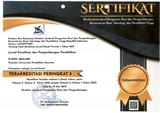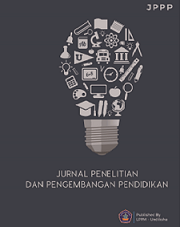English Teaching Through Literature-Based Instruction: What do Teachers Experience?
DOI:
https://doi.org/10.23887/jppp.v7i2.64368Keywords:
Literature-based Instruction, English Teaching, International Primary SchoolAbstract
Literature-based instruction is one of the methods that the teacher can used in teaching English to improve student’s four basic skills in English. As a result, this paper aimed to investigate a) to identify the procedures used by teacher in implementing literature-based instruction during distance learning to improve four basic English skills in the classroom at Gandhi Memorial International School, b) to analyze the challenges faced by teacher in implementing literature- based instruction during distance learning at Gandhi Memorial International School. The implementation of Literature-Based Instruction was carried out for Primary International School grade 5 at Gandhi Memorial International School. This study used qualitative research as a research method. The subject of this research was an English teacher in class 5B at Gandhi Memorial International School. Data were collected using an observation checklist and interview guidelines. The result of the data that had been collected from the first question was that the procedure carried out by the teacher is to carry out three stages, namely; pre-activity, whilst activity, and post-activity. Then, the findings for the second research question were that there are three challenges that teachers encountered, namely; time constraints, differentiated instructions, and various assessment rubrics.
References
Abdel Latif, M. M. M. (2022). EFL teachers’ critical literacy instructional perspectives and practices: The case of the Egyptian university context. Teaching and Teacher Education, 115. https://doi.org/10.1016/J.TATE.2022.103733. DOI: https://doi.org/10.1016/j.tate.2022.103733
Amir, H., Sudarman, S., Asfar, A., & Batara, A. S. (2020). Covid19 Pandemic: Management and Global Response. Jurnal Kesehatan Lingkungan, 12(1si), 121. https://doi.org/10.20473/jkl.v12i1si.2020.121-128. DOI: https://doi.org/10.20473/jkl.v12i1si.2020.121-128
Arya, P., Martens, P., Wilson, G. P., Altwerger, B., Jin, L., & Laster, B. (2005). Reclaiming literacy instruction: Evidence in support of literature-based programs. Language Arts, 83(1), 63–72. https://citeseerx.ist.psu.edu/document?repid=rep1&type=pdf&doi.
Aytaç, T., & Ahi, K. (2021). The problems faced by teachers in Turkey during the COVID-19 pandemic and their opinions. International Journal of Progressive Education, 17(1), 2021. https://doi.org/10.29329/ijpe.2020.329.26. DOI: https://doi.org/10.29329/ijpe.2021.329.26
Basoglu, U. D. (2018). The Importance of Physical Literacy for Physical Education and Recreation. Journal of Education and Training Studies, 6(4), 139. https://doi.org/10.11114/jets.v6i4.3022. DOI: https://doi.org/10.11114/jets.v6i4.3022
Bayley, S. H. (2022). Learning for adaptation and 21st-century skills: Evidence of pupils’ flexibility in Rwandan primary schools. International Journal of Educational Development, 93(March 2021), 102642. https://doi.org/10.1016/j.ijedudev.2022.102642. DOI: https://doi.org/10.1016/j.ijedudev.2022.102642
Begum, J. (2019). Learner autonomy in efl/esl classrooms in bangladesh: Teachers’ perceptions and practices. International Journal of Language Education, 3(1), 12–21. https://doi.org/10.26858/ijole.v2i2.6411. DOI: https://doi.org/10.26858/ijole.v1i1.6397
Bobkina, J., & Dominguez, E. (2014). The use of literature and literary texts in the EFL classroom; between consensus and controversy. International Journal of Applied Linguistics and English Literature, 3(2), 248–260. https://doi.org/10.7575/aiac.ijalel.v.3n.2p.248. DOI: https://doi.org/10.7575/aiac.ijalel.v.3n.2p.248
Bušelić, M. (2012). Distance Learning – concepts and contributions. Oeconomica Jadertina, 2(1), 23–34. https://doi.org/10.15291/oec.209. DOI: https://doi.org/10.15291/oec.209
Clack, A., & Dommett, E. J. (2021). Student learning approaches: Beyond assessment type to feedback and student choice. Education Sciences, 11(9). https://doi.org/10.3390/educsci11090468. DOI: https://doi.org/10.3390/educsci11090468
Ekwueme, C. O., Ekon, E. E., & Ezenwa-Nebife, D. C. (2015). The Impact of Hands-On-Approach on Student Academic Performance in Basic Science and Mathematics. Higher Education Studies, 5(6), 47. https://doi.org/10.5539/hes.v5n6p47 DOI: https://doi.org/10.5539/hes.v5n6p47
Ganesha, P., & Nandiyanto, A. B. D. (2021). Application of Online Learning During the Covid-19 Pandemic through Zoom Meeting at Karya Mekar Elementary School. Indonesian Journal of Teaching in Science, 1(1), 1–8. http://download.garuda.kemdikbud.go.id/article.php?article=2432152&val=23269&title. DOI: https://doi.org/10.17509/ijotis.v1i1.33534
Gibson, J. (2007). Fiction and the Weave of Life. Fiction and the Weave of Life. https://doi.org/10.1093/acprof:oso/9780199299522.001.0001. DOI: https://doi.org/10.1093/acprof:oso/9780199299522.001.0001
Halili, S. H. (2019). Technological Advancements in Education 4.0. The Online Journal of Distance Education and E-Learning, 7(1), 63–69. https://tojdel.net/journals/tojdel/volumes/tojdel-volume07.
Hasiru, D., Badu, S. Q., & Uno, H. B. (2021). Media-Media Pembelajaran Efektif dalam Membantu Pembelajaran Matematika Jarak Jauh. Jambura Journal of Mathematics Education, 2(2), 59–69. https://doi.org/10.34312/jmathedu.v2i2.10587. DOI: https://doi.org/10.34312/jmathedu.v2i2.10587
Hima, A. N., Saputro, T. H., & Farah, R. R. (2021). Benefits and challenges of doing task-based language teaching in Indonesia: Teachers’ perception. KEMBARA Journal of Scientific Language Literature and Teaching, 7(1), 131–142. https://doi.org/10.22219/kembara.v7i1.15805. DOI: https://doi.org/10.22219/kembara.v7i1.15805
Hoffman, J., Mccarthy, S. J., Abbott, J. A., Bayles, D., Price, D., & Elliot, B. (1996). Literature-based reading instruction : Problems, possibilities & polemics in the struggle to change.
Hong, J. C., Liu, X., Cao, W., Tai, K. H., & Zhao, L. (2022). Effects of Self-Efficacy and Online Learning Mind States on Learning Ineffectiveness during the COVID-19 Lockdown. Educational Technology and Society, 25(1), 142–154. https://www.jstor.org/stable/48647036.
Hwang, W. Y., Shadiev, R., Hsu, J. L., Huang, Y. M., Hsu, G. L., & Lin, Y. C. (2016). Effects of storytelling to facilitate EFL speaking using Web-based multimedia system. Computer Assisted Language Learning, 29(2), 215–241. https://doi.org/10.1080/09588221.2014.927367. DOI: https://doi.org/10.1080/09588221.2014.927367
Ibáñez, M.-B., & Delgado-Kloos, C. (2018). Augmented reality for STEM learning: A systematic review. Computers & Education, 123, 109–123. https://doi.org/10.1016/j.compedu.2018.05.002. DOI: https://doi.org/10.1016/j.compedu.2018.05.002
Ibrahim-González, N., & Noordin, N. (2012). Learner Autonomy via Self-Assessment in Consecutive Interpreting for Novice Learners in a Non-Interpreting Environment. Sino-US English Teaching, 9(4), 1065–1073. https://www.researchgate.net/profile/Noraini-Ibrahim-Gonzalez/publication/309193469.
Keezhatta, M. S., & Omar, A. (2019). Enhancing Reading Skills for Saudi Secondary School Students through Mobile Assisted Language Learning (MALL): An Experimental Study. International Journal of English Linguistics, 9(1), 437. https://doi.org/10.5539/ijel.v9n1p437 DOI: https://doi.org/10.5539/ijel.v9n1p437
Khatoony, S., & Nezhadmehr, M. (2020). EFL teachers’ challenges in integration of technology for online classrooms during Coronavirus (COVID-19) pandemic in Iran. AJELP: Asian Journal of English Language and Pedagogy, 8(2), 1–16. https://doi.org/10.37134/ajelp.vol8.sp.1.2020.
Kinasih, S., & Sinaga, K. (2020). Kajian Penerapan Teori Pembelajaran Bermakna Ausubel Berdasarkan Perspektif Alkitabiah Pada Materi Hidrokarbon [a Study on the Application of Ausubel’S Meaningful Learning Theory on Hydrocarbon Chemical Learning Based on a Biblical Perspective]. Polyglot: Jurnal Ilmiah, 16(2), 141–153. https://doi.org/10.19166/pji.v16i2.2128. DOI: https://doi.org/10.19166/pji.v16i2.2128
Klarer, M. (2004). An Introduction to Literary Studies. Routledge. https://doi.org/10.4324/9780203414040. DOI: https://doi.org/10.4324/9780203414040
Kusmaryono, I., Jupriyanto, J., & Kusumaningsih, W. (2021). A Systematic Literature Review on the Effectiveness of Distance Learning: Problems, Opportunities, Challenges, and Predictions. International Journal of Education, 14(1), 62–69. https://doi.org/10.17509/ije.v14i1.29191. DOI: https://doi.org/10.17509/ije.v14i1.29191
Mahayanti, N. W. S., Artini, L. P., & Jannah, N. (2017). the Effect of Big Book As Media on Students’ Reading Comprehension At Fifth Grade of Elementary School in Sd Laboratorium Undiksha Singaraja. International Journal of Language and Literature, 1(3), 2549–4287. https://doi.org/10.23887/ijll.v1i3.12544. DOI: https://doi.org/10.23887/ijll.v1i3.12544
Moustafa, B. S. M. (2022). A comparative corpus stylistic analysis of thematization and characterization in Gordimer’s My Son’s Story and Coetzee’s Disgrace. Open Linguistics, 8(1), 46–64. https://doi.org/10.1515/opli-2020-0183. DOI: https://doi.org/10.1515/opli-2020-0183
Nabhan, S. (2019). Bringing multiliteracies into process writing approach in ELT classroom: Implementation and reflection. EduLite: Journal of English Education, Literature and Culture, 4(2), 156–170. https://doi.org/10.30659/e.4.2.156-170. DOI: https://doi.org/10.30659/e.4.2.156-170
Nana, N. (2020). Pengembangan Inovasi Modul Digital dengan Model POE2WE Sebagai Salah Satu Alternatif Pembelajaran Daring di Masa New Normal. Prosiding SNFA (Seminar Nasional Fisika Dan Aplikasinya), 5(0). https://doi.org/10.20961/PROSIDINGSNFA.V5I0.46607. DOI: https://doi.org/10.20961/prosidingsnfa.v5i0.46607
Nkhoma, C., Nkhoma, M., Thomas, S., & Le, N. Q. (2020). The Role of Rubrics in Learning and Implementation of Authentic Assessment: A Literature Review. Proceedings of the 2020 InSITE Conference, January, 237–276. https://doi.org/10.28945/4606. DOI: https://doi.org/10.28945/4606
Nursyahrina, H., Retami, L. H., Pratama, R., Salsabil, S. P., & Ihsan, M. T. (2021). the Use of Google Classroom in English Teaching and Learning Process At Senior High School Level. Jurnal Riset Dan Inovasi Pembelajaran, 1(2), 123–133. https://doi.org/10.51574/jrip.v1i2.41. DOI: https://doi.org/10.51574/jrip.v1i2.41
Piscayanti, K. S. (2010). The Effect of Literature-based Instruction on Student’s English Achievement with Differing Achievement Motivation an Experimental Study on the Eighth Grade Students of SMPN 1 Singaraja in Academic Year 2009-2010. Jurnal Ilmiah Pendidikan Dan Pembelajaran Ganesha, 7(1), 97728. https://www.academia.edu/download/91007851/97728.
Pourhosein Gilakjani, A., & Sabouri, N. B. (2016). How Can Students Improve Their Reading Comprehension Skill? Journal of Studies in Education, 6(2), 229. https://doi.org/10.5296/jse.v6i2.9201. DOI: https://doi.org/10.5296/jse.v6i2.9201
Puspitasari, E. (2016). Literature-Based Learning to Build Students’ Vocabulary. Journal of Foreign Language Teaching and Learning, 1(1). https://doi.org/10.18196/ftl.115. DOI: https://doi.org/10.18196/ftl.115
Rahman, R., Sopandi, W., Widya, R. N., & Yugafiati, R. (2019). Literacy in The Context of Communication Skills for The 21st Century Teacher Education in Primary School Students. International Journal of Science and Applied Science: Conference Series, 3(1), 101. https://doi.org/10.20961/ijsascs.v3i1.32462. DOI: https://doi.org/10.20961/ijsascs.v3i1.32462
Riddell, J. (2015). Performance, Feedback, and Revision: Metacognitive Approaches to Undergraduate Essay Writing. Collected Essays on Learning and Teaching, 8, 79. https://doi.org/10.22329/celt.v8i0.4256. DOI: https://doi.org/10.22329/celt.v8i0.4256
Ridhwan, M. (2017). Understanding Formative and Summative Assessment for EFL Teachers: Theoretical Reflections on Assessment for Learning. J-SHMIC : Journal of English for Academic, 4(1), 40–50. https://doi.org/10.25299/jshmic.2017.vol4(1).505. DOI: https://doi.org/10.25299/jshmic.2017.vol4(1).505
Rogowsky, B. A., Calhoun, B. M., & Tallal, P. (2015). Matching learning style to instructional method: Effects on comprehension. Journal of Educational Psychology, 107(1), 64–78. https://doi.org/10.1037/a0037478. DOI: https://doi.org/10.1037/a0037478
Sadiku, L. M. (2015). The Importance of Four Skills Reading, Speaking, Writing, Listening in a Lesson Hour. European Journal of Language and Literature, 1(1), 29. https://doi.org/10.26417/ejls.v1i1.p29-31. DOI: https://doi.org/10.26417/ejls.v1i1.p29-31
Salam El-Dakhs, D. A. (2020). Variation of metadiscourse in L2 writing: Focus on language proficiency and learning context. Ampersand, 7, 100069. https://doi.org/10.1016/j.amper.2020.100069. DOI: https://doi.org/10.1016/j.amper.2020.100069
Samanhudi, U., & Widianingsih, S. (2017). A Study on Qualitative Research to The Development of English Language Teaching (ELT) In Indonesia. JURNAL BÉBASAN, 4(2), 106–120. http://jurnalbebasan.kemdikbud.go.id/jurnal/index.php/bebasan/article/download/85/58.
Siahaan, M. (2020). Dampak Pandemi Covid-19 Terhadap Dunia Pendidikan. Jurnal Kajian Ilmiah, 1(1), 73–80. https://doi.org/10.31599/jki.v1i1.265. DOI: https://doi.org/10.31599/jki.v1i1.265
Sjahruddin, H., Ramli, M., Anaconda Bangkara, B., & Fatmawati, E. (2022). Technological Innovation to Support 21st Century Learning Outcomes and Sustainability at Universitas Islam Negeri (UIN) Antasari. Jurnal Iqra’ : Kajian Ilmu Pendidikan, 7(1), 63–76. https://doi.org/10.25217/ji.v7i1.1473. DOI: https://doi.org/10.25217/ji.v7i1.1473
Suwastini, N. K. A., & Yukti, W. G. S. (2017). Errors analysis in short biography text written by the 11th grade students of a vocational high school in Singaraja. International Journal of Language and Literature, 1(1), 1–10. https://doi.org/10.23887/ijll.v1i1.9612. DOI: https://doi.org/10.23887/ijll.v1i1.9612
Syahfutra, W. (2021). Students’ Speaking Anxiety in English Education Study Program. ELT-Lectura, 8(1), 74–83. https://doi.org/10.31849/elt-lectura.v8i1.5920. DOI: https://doi.org/10.31849/elt-lectura.v8i1.5920
Tanjung, P. A., & Ashadi, A. (2019). Differentiated instruction in accommodating individual differences of EFL students. Celtic: A Journal of Culture, English Language Teaching, Literature, & Linguistics, 6(2), 63. https://doi.org/10.22219/celticumm.vol6.no2.63-72. DOI: https://doi.org/10.22219/CELTICUMM.Vol6.No2.63-72
Taşçı, S., & Turan, Ü. D. (2021). The Contribution of Lexical Breadth, Lexical Depth, and Syntactic Knowledge to L2 Reading Comprehension Across Different L2 Reading Proficiency Groups. English Teaching and Learning, 45(2), 145–165. https://doi.org/10.1007/s42321-020-00065-z. DOI: https://doi.org/10.1007/s42321-020-00065-z
Tasya, P. N. A. (2021). New Normal and Social Change in Indonesia Society. Media Komunikasi FPIPS, 20(1), 22. https://doi.org/10.23887/mkfis.v20i1.30423. DOI: https://doi.org/10.23887/mkfis.v20i1.30423
Wei, X., Saab, N., & Admiraal, W. (2021). Assessment of cognitive, behavioral, and affective learning outcomes in massive open online courses: A systematic literature review. Computers and Education, 163, 104097. https://doi.org/10.1016/j.compedu.2020.104097. DOI: https://doi.org/10.1016/j.compedu.2020.104097
Widyastono, H. (2017). Pemanfaatan Teknologi Informasi dan Komunikasi pada Sekolah Menengah pertama Negeri Akreditasi A di Provinsi Jawa Timur. Jurnal Kwangsan, 5(1), 21–38. https://doi.org/10.31800/jurnalkwangsan.v5i1.37. DOI: https://doi.org/10.31800/jtp.kw.v5n1.p21--38
Wilson, K. M. (n.d.). Literature-Based Instruction in the ESL Classroom.
Yunus, A. A., & Syafi’i, A. (2020). Google Classroom as Learning Platform in Teaching Writing. British (Jurnal Bahasa Dan Sastra Inggris), 9(1), 48–64. https://journal.umgo.ac.id/index.php/British/article/view/473. DOI: https://doi.org/10.31314/british.9.1.48-64.2020
Yuzulia, I. (2021). The Challenges of Online Learning during Pandemic: Students’ Voice. Jurnal Pendidikan Dan Pengajaran, 13(1), 08–12. https://doi.org/10.31294/w.v13i1.9759. DOI: https://doi.org/10.31294/w.v13i1.9759
Downloads
Published
How to Cite
Issue
Section
License
Copyright (c) 2023 IGA Lokita Purnamika Utami, I Gusti Ngurah Agung Mahardika

This work is licensed under a Creative Commons Attribution-ShareAlike 4.0 International License.
Authors who publish with the Jurnal Penelitian dan Pengembangan Pendidikan agree to the following terms:
- Authors retain copyright and grant the journal the right of first publication with the work simultaneously licensed under a Creative Commons Attribution License (CC BY-SA 4.0) that allows others to share the work with an acknowledgment of the work's authorship and initial publication in this journal.
- Authors are able to enter into separate, additional contractual arrangements for the non-exclusive distribution of the journal's published version of the work (e.g., post it to an institutional repository or publish it in a book), with an acknowledgment of its initial publication in this journal.
- Authors are permitted and encouraged to post their work online (e.g., in institutional repositories or on their website) prior to and during the submission process, as it can lead to productive exchanges, as well as earlier and greater citation of published work. (See The Effect of Open Access)







